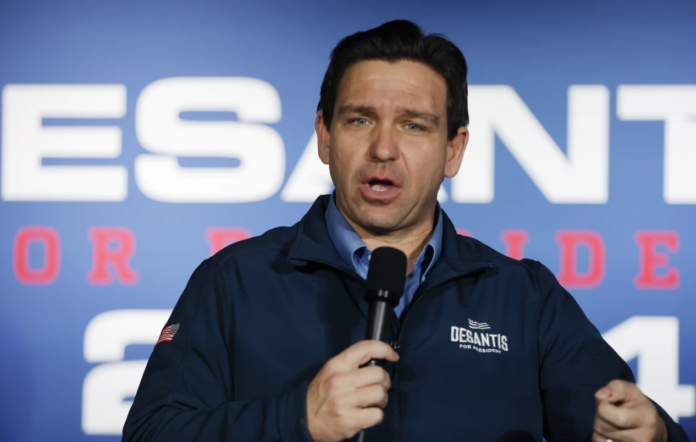By Steve Peoples and Jill Colvin
Associated Press
MANCHESTER, N.H. — Florida Gov. Ron DeSantis suspended his Republican presidential campaign on Sunday, ending his 2024 White House bid just before the New Hampshire primary while endorsing his bitter rival Donald Trump.
The decision leaves Trump and former U.N. Ambassador Nikki Haley as the last major candidates remaining in the race ahead of Tuesday’s New Hampshire primary. This is the scenario Trump’s foes in the GOP have long sought, raising the stakes for this week’s contest as the party’s last chance to stop the former president who has so far dominated the race.
But as some Trump critics cheered, DeSantis nodded toward Trump’s primary dominance — and attacked Haley — in an exit video he posted on social media.
“It’s clear to me that a majority of Republican primary voters want to give Donald Trump another chance,” DeSantis said in the straight-to-camera video, delivered in a cheerful tone, through forced smiles.
He continued: “I signed a pledge to support the Republican nominee and I will honor that pledge. He has my endorsement because we can’t go back to the old Republican guard of yesteryear, a repackaged form of warmed-over corporatism that Nikki Haley represents.”
Haley fired back during a campaigning stop in Seabrook, New Hampshire, just as DeSantis announced his decision.
“He ran a great race, he’s been a good governor, and we wish him well,” she told a room packed with supporters and media. “Having said that, it’s now one fella and one lady left.“
DeSantis’ decision, while perhaps not surprising given his 30-point blowout loss last week in Iowa, marks the end of an extraordinary decline for a high-profile governor once thought to be a legitimate threat to Trump’s supremacy in the Republican Party.
He entered the 2024 presidential contest with major advantages in his quest to take on Trump, and early primary polls suggested DeSantis was in a strong position to do just that. He and his allies amassed a political fortune well in excess of $130 million, and he boasted a significant legislative record on issues important to many conservatives, like abortion and the teaching of race and gender issues in schools.
Such advantages did not survive the reality of presidential politics in 2024. From a high-profile announcement that was plagued by technical glitches to constant upheavals to his staff and campaign strategy, DeSantis struggled to find his footing in the primary. He lost the Iowa caucuses — which he had vowed to win — by 30 percentage points to Trump.
DeSantis’ allies said that private discussions began shortly after Iowa to decide how to bow out of the race gracefully.
The Florida governor notified top donors and supporters of his decision through a series of phone conversations and text messages between senior campaign officials to top donors and supporters on Sunday afternoon, according to two people who received such communications. They spoke on the condition of anonymity to disclose the private conversations.
DeSantis had returned to Florida by then after a rollercoaster weekend that included stops in New Hampshire and then South Carolina ahead of another scheduled stop in New Hampshire Sunday evening that was ultimately canceled. The campaign also canceled a series of national television experiences earlier in the day, blaming the cancelation on a miscommunication with DeSantis’ super PAC.
DeSantis was physically worn after spending weeks on the campaign with little, if any, time off, even as he stormed across frigid Iowa and New Hampshire, often without a winter coat.
He ultimately decided that he needed to endorse Trump given his popularity in the party, despite the deeply personal feud between them.
“While I’ve had disagreements with Donald Trump, such as on the coronavirus pandemic and his elevation of Anthony Fauci, Trump is superior to the current incumbent, Joe Biden. That is clear,” said DeSantis, who is in his second and final term as Florida’s governor, which ends in January 2027.





